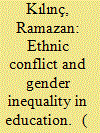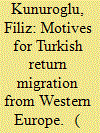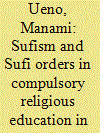| Srl | Item |
| 1 |
ID:
159339


|
|
|
|
|
| Summary/Abstract |
This paper aims to investigate the Afghan-Turkish-European region migration system in light of migration system theory, which provides a comprehensive framework by asking the question of how a set of linkages including some macro-, meso- and micro-level variables relate to the larger context of migratory settings. Relating the roles of various structures, institutions and networks to the operation of the social, political and economic relationships, it seeks to analyze the dynamics of Afghan migration heading to Turkey and Europe in a historically contextualized way. The paper argues that one must focus on the root causes of flows, which are related to the presence of fragility of the Afghan state together with the continuation of flows via networks enabling the maintenance of migrants’ links to home, transit and destination countries.
|
|
|
|
|
|
|
|
|
|
|
|
|
|
|
|
| 2 |
ID:
159336


|
|
|
|
|
| Summary/Abstract |
Although conflict remains a major obstacle to development in many areas of the world, its impact on education has been rarely studied. This article investigates the relationship between conflict and gender equality, focusing on the schooling of the girls in the conflict-ridden regions of Turkey. Patriarchy is the most important determinant of low educational levels among girls in Southeastern Turkey. However, ethnic conflict exacerbates male-dominant traditions and blocks economic development, reinforcing patriarchal norms and limiting girls’ school attendance. Yet, by provoking political mobilization around a Kurdish identity, ethnic conflict may undermine patriarchy and unintentionally promote girls’ education.
|
|
|
|
|
|
|
|
|
|
|
|
|
|
|
|
| 3 |
ID:
159338


|
|
|
|
|
| Summary/Abstract |
This article examines the Turkish National Security Council's (NSC's) constitutional status within the executive organ of the state. It surveys security councils of 31 countries to demonstrate the peculiarity of the NSC's status. It explores how the constitutional articles on the NSC were developed in the making of the 1961 and 1982 Turkish Constitutions. It examines the discussions in constituent assemblies, draft constitutions and reasoned reports of constitutional commissions in order to ascertain the motives behind the establishment of this tutelary council. The paper also offers insights into the importance and meaning of reforms that the NSC has undergone since 2001.
|
|
|
|
|
|
|
|
|
|
|
|
|
|
|
|
| 4 |
ID:
159337


|
|
|
|
|
| Summary/Abstract |
This article explores return migration motivations of different generations of Turkish migrants returning from Germany, the Netherlands and France, using semi-structured face-to-face interviews among 48 informants. The study draws on a qualitative approach and inductive content analysis to get insight into how pre-return, migration and transnational experiences of Turkish migrants influence their decisions to return to Turkey. It was found that an ambition to return to Turkey already present when migrating from Turkey, perceived discrimination in Western Europe and a strong sense of belonging to Turkey play the most important role in return decisions.
|
|
|
|
|
|
|
|
|
|
|
|
|
|
|
|
| 5 |
ID:
159333


|
|
|
|
|
| Summary/Abstract |
Radicalization and pathways to terrorism have been issues of dispute which owe their complexity to multiple dimensions and perspectives from different disciplines at different levels. This study focuses on the two competing perspectives on joining violent radical groups represented in the Hofman-Sageman debate: recruitment/facilitation or enlistment. It also elaborates on affiliative factors (kinship/first-circle-peers) and religiosity to analyze the conditions under which university students were drawn into Turkish Hezbollah (TH), a terrorist organization in Turkey. By using individual-level self-report data this study finds that kinship structures had a determinative impact on individuals’ enlistment through ‘Social Learning,’ specifically, on embracing TH membership as a ‘favorable definition’ and/or a ‘norm’ within their original habitat. Yet, weakened ‘Social Control/Bond’ from home/original habitat made students significantly more vulnerable to TH’s recruitment structures. This study argues that both approaches – recruitment and enlistment – have substantial explanatory power; however, under certain underlying sociological conditions. In that while weakened social bonds supplement recruitment, having militants in kinship structures particularly make young college students vulnerable to be drawn into violent radical networks through enlistment. This study also asserts that neither the religiosity of militants nor that of their families had a statistically significant effect on their integration into TH.
|
|
|
|
|
|
|
|
|
|
|
|
|
|
|
|
| 6 |
ID:
159335


|
|
|
|
|
| Summary/Abstract |
The governments of the Turkish Republic have claimed the authority to decide what kind of Islam is or is not desirable for Turkish citizens. This article explores how the governments after the 1980 coup infiltrated the negative image of Sufi orders into compulsory religious education and how the Justice and Development Party regime has been trying to modify it. To do so, it investigates the descriptions of Sufi orders as well as Sufism in the textbooks studied as part of the mandatory Religious Culture and Morals course from the beginning of 1982 to present.
|
|
|
|
|
|
|
|
|
|
|
|
|
|
|
|
| 7 |
ID:
159334


|
|
|
|
|
| Summary/Abstract |
This paper investigates the main determinants of Turkish public opinion on the use and utility of military force. Regression analyses based on survey data from a nationally representative sample demonstrate that socioeconomic and attitudinal factors perform better than demographic attributes in predicting individual support for the use of force. Accordingly, a high school degree, trust in the UN, and financial satisfaction have positive and significant association with isolationist foreign policy attitudes, whereas national pride, trust in the army, satisfaction with the government’s foreign policy performance and self-placement on the political right exert a positive effect toward militant foreign policy dispositions. The analyses also reveal considerable variation in individual attitudes between the supporters of the Adalet ve Kalkınma Partisi and Milliyetçi Hareket Partisi on the one hand, and the Cumhuriyet Halk Partisi and Halkların Demokratik Partisi on the other hand.
|
|
|
|
|
|
|
|
|
|
|
|
|
|
|
|